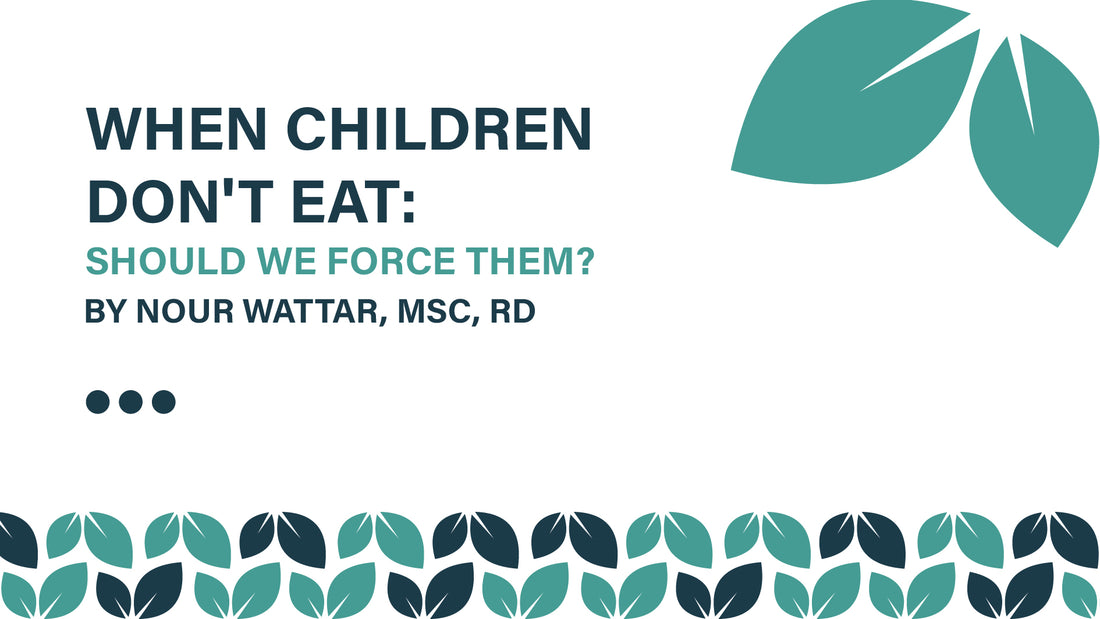
When children don't eat: Should we force them?
Share
As health-conscious parents striving to nurture well-rounded eaters, you might often encounter the tricky terrain of mealtimes with children who are selective about their food. You may find yourself pondering the dilemma: should I force my children to eat when they resist?
'Force feeding' can refer to a range of practices, from physical coercion to distraction feeding with screens or employing a reward/punishment system.
As a pediatric registered dietitian, I frequently encounter this question from concerned parents. The underlying intention is always commendable—ensuring children don't miss out on essential nutrients, combined with the hope that exposure might eventually lead to acceptance.
However, the straightforward answer is no. Applying pressure on your picky eaters to consume food can exacerbate the issue in the long term. It can increase the meal time stress and further decrease interest in foods making it less likely to like the forced food in the future. Here’s why and what to consider instead:
Understanding Growth and Nutritional Needs
When a child resists eating, assessing their growth pattern is critical. Are they meeting their developmental milestones and maintaining healthy growth curves as reviewed by their healthcare provider?
If a child is underweight or displays signs of nutritional deficiencies, consulting a healthcare professional, such as a registered dietitian, is crucial. A tailored approach based on the underlying reasons for the child’s disinterest in food—be it sensory sensitivities, low appetite, difficulty chewing, or medical conditions—is much more effective.
Sometimes, a parent’s perception of adequate food intake/growth and the child’s actual nutritional requirements might not align, leading to unnecessary mealtime pressure. Children may not be hungry simply because their dietary needs are already met, and forcing additional food can result in unhealthy weight gain relative to their height or an above-average body mass index.
Fostering a Positive Mealtime Environment
For children with selective eating habits, creating a positive and pressure-free mealtime environment is crucial. The goal is to encourage exploration and curiosity about food, not to coerce. Engaging children in discussions about the sensory attributes of food—their colors, shapes, textures, and smells—and involving them in meal preparation can demystify new foods and make tasting them less intimidating. Remember, familiarity breeds comfort, and repeated exposure is often necessary before a child (or an adult!) accepts a new food.
Nutritional Safeguards
During this exploratory phase, ensuring your child’s nutritional needs are met is vital. Consulting with a dietitian can offer peace of mind and guidance on whether supplements are needed to bridge any nutritional gaps without resorting to force-feeding. Not all supplements are created equal. For example, for a picky eater in Canada with limited intake of iron-rich protein, a multivitamin containing iron (such as Animal Parade's multi) might be beneficial. In contrast, for those struggling mainly with fruits and vegetables but getting enough iron, a vitamin-rich gummy (like allKids multi gummy bears) may be more suitable. Always consult your healthcare professional to choose the best option.
At Feeding Solutions, we understand the complexities of feeding children and are committed to supporting parents by facilitating access to products, including healthy snacks, supplements, and oral motor therapy tools as advised by healthcare professionals. Our mission is to empower you to foster a nurturing, stress-free dining experience that promotes nutritional health and positive eating habits for life.
Embracing patience and understanding, coupled with professional support, can transform mealtime from a battleground into a journey of discovery and growth for both you and your child. Let’s navigate this path together, ensuring a healthier, happier future for our little ones.
Summary
In summary, forcing feeding is highly discouraged and may further decrease interest in eating. Instead, identify the reasons behind selective eating with a professional, and complement nutritional intake in the short term while positively working on repeated exposures for long-term effective results.
By Nour Wattar, MSc, RD
Registered Dietitian Nutritionist
